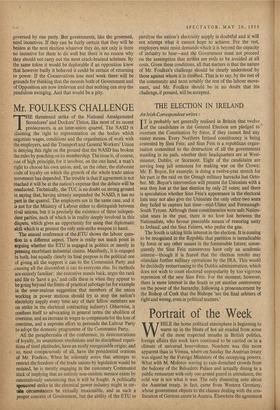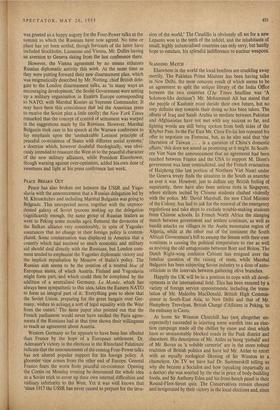of the most respected mouths in British politics, foreign affairs
this week have continued to be carried on in a climate of universal benevolence. Nowhere was this more apparent than in Vienna, where on Sunday the Austrian treaty was signed by the Foreign Ministers of the occupying powers. What with M. Molotov waving to rain-drenched crowds from the balcony of the Belvedere Palace and actually dining in a public restaurant with only one armed guard in attendance, the cold war is not what it was. The only dissenting note about the Austrian treaty, in fact, came from Western Germany, whose government objects to the clauses dealing with the con- fiscation of German assets in Austria. Elsewhere the agreement was greeted as a happy augury for the Four-Power talks at the summit to which the Russians have now agreed. No time or place has yet been settled, though forecasts of the latter have included Stockholm, Lausanne and Vienna, Mr. Dulles having an aversion to Geneva dating from the last conference there.
However, the Vienna agreement by no means exhausts Russian diplomatic activity this week. At the same time as they were putting forward their new disarmament plan, which was enigmatically described by Mr. Nutting, chief British dele- gate to the London disarmament talks, as 'in many ways an encouraging development,' the Soviet Government were setting up a military organisation in Eastern Europe corresponding to NATO, with Marshal Koniev as Supreme Commander. It may have been this coincidence that led the American press to receive the Soviet plan a little coolly; the New York Times remarked that the concept of control of armament was warped in the suggestions made by the Russians. However, Marshal Bulganin took care in his speech at the Warsaw conference to lay emphasis upon the 'unshakeable Leninist principle of peaceful co-existence of States with different social systems,' a doctrine which, however doubtful theologically, was obvi- ously intended to reassure the West as to the peaceful character of the new military alliances, while President Eisenhower, though warning against over-optimism, added his\own dose of sweetness and light at his press conference last week.











































 Previous page
Previous page